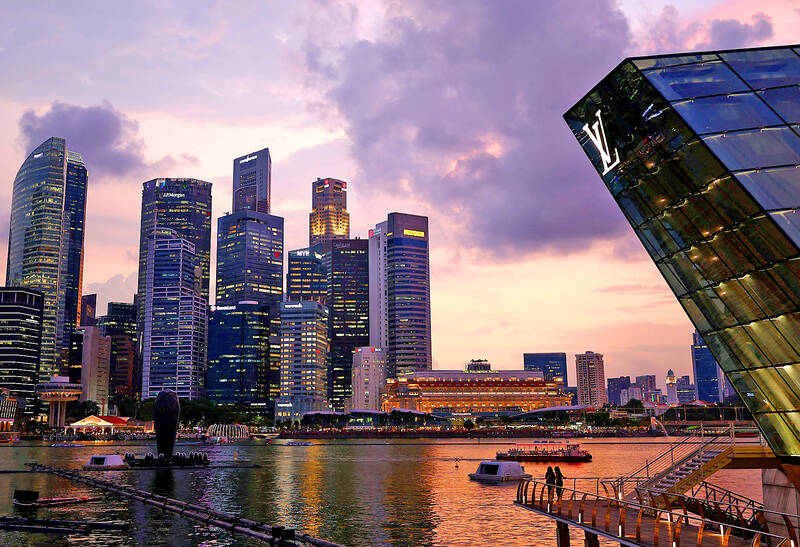Singapore remains the most expensive city in the world for spending on luxury goods such as jewelry and shoes and services including dining, healthcare and education.
Rival Hong Kong climbed one spot from last year to second, while London rose one place to third, an annual report by Swiss wealth manager Julius Baer Group Ltd showed.
Singapore has continued to attract the ultra-wealthy by maintaining its reputation for political and economic stability, alongside a pro-business environment. Hong Kong is the most expensive territory on the list for engaging a lawyer and the second most for buying property.

Photo: Reuters
London rose partly on the strength of the pound and “some normalization” post-Brexit.
Meanwhile, Shanghai dropped to fourth, likely due to challenges in the real-estate market and softening consumer confidence, the report said.
Tokyo plummeted to 23rd due to the weakening yen.
Many of the biggest changes in the index are due to currency fluctuations as index prices are converted to US dollars for global comparison, the report said.
Santiago is now a more expensive place to live than Tokyo in US dollar terms — a situation that would once have been “unimaginable,” it said.
Zurich climbed to sixth and was the year’s biggest gainer, largely due to the strength of the Swiss franc.
Julius Baer’s Lifestyle Index ranks the world’s 25 most expensive cities by analyzing residential property, vehicles, business-class flights, school, degustation dinners and other luxuries. The bank surveyed high-net-worth individuals with bankable household assets of US$1 million or more from February to March.
Europe, the Middle East and Africa went from being the most affordable region last year to the most expensive, with “significant price increases” and every European city moving up the rankings. Strong exchange rates prompted a change in the region’s fortunes.
There are “pockets of affordability” in Europe, according to the report.
The region is the cheapest place to buy champagne and whiskey, while France is home to the Champagne region and Scotland boasts more distilleries than anyone else, it said.
Dubai dropped to 12th from seventh last year, and while Singapore and Hong Kong took the top spots, other Asian cities, notably Tokyo, Bangkok and Jakarta fell in the rankings.
In Singapore, wealthy individuals are favoring “discreet over more overt expressions of wealth,” with sales of watches, cars, apartments and other luxury goods dropping.
Overall, price increases slowed to 4 percent from 6 percent last year across the index of goods and services.
The cost of bicycles fell nearly everywhere, almost certainly due to a glut of bikes after the COVID-19 pandemic, while other areas that dropped included business-class flights, with travel returning to normal after post-pandemic demand sent prices skyrocketing, the report said.
Jewelry, ladies’ shoes and men’s suits showed the biggest gains.

When an apartment comes up for rent in Germany’s big cities, hundreds of prospective tenants often queue down the street to view it, but the acute shortage of affordable housing is getting scant attention ahead of today’s snap general election. “Housing is one of the main problems for people, but nobody talks about it, nobody takes it seriously,” said Andreas Ibel, president of Build Europe, an association representing housing developers. Migration and the sluggish economy top the list of voters’ concerns, but analysts say housing policy fails to break through as returns on investment take time to register, making the

‘SILVER LINING’: Although the news caused TSMC to fall on the local market, an analyst said that as tariffs are not set to go into effect until April, there is still time for negotiations US President Donald Trump on Tuesday said that he would likely impose tariffs on semiconductor, automobile and pharmaceutical imports of about 25 percent, with an announcement coming as soon as April 2 in a move that would represent a dramatic widening of the US leader’s trade war. “I probably will tell you that on April 2, but it’ll be in the neighborhood of 25 percent,” Trump told reporters at his Mar-a-Lago club when asked about his plan for auto tariffs. Asked about similar levies on pharmaceutical drugs and semiconductors, the president said that “it’ll be 25 percent and higher, and it’ll

NOT TO WORRY: Some people are concerned funds might continue moving out of the country, but the central bank said financial account outflows are not unusual in Taiwan Taiwan’s outbound investments hit a new high last year due to investments made by contract chipmaker Taiwan Semiconductor Manufacturing Co (TSMC, 台積電) and other major manufacturers to boost global expansion, the central bank said on Thursday. The net increase in outbound investments last year reached a record US$21.05 billion, while the net increase in outbound investments by Taiwanese residents reached a record US$31.98 billion, central bank data showed. Chen Fei-wen (陳斐紋), deputy director of the central bank’s Department of Economic Research, said the increase was largely due to TSMC’s efforts to expand production in the US and Japan. Investments by Vanguard International

WARNING SHOT: The US president has threatened to impose 25 percent tariffs on all imported vehicles, and similar or higher duties on pharmaceuticals and semiconductors US President Donald Trump on Wednesday suggested that a trade deal with China was “possible” — a key target in the US leader’s tariffs policy. The US in 2020 had already agreed to “a great trade deal with China” and a new deal was “possible,” Trump said. Trump said he expected Chinese President Xi Jinping (習近平) to visit the US, without giving a timeline for his trip. Trump also said that he was talking to China about TikTok, as the US seeks to broker a sale of the popular app owned by Chinese firm ByteDance Ltd (字節跳動). Trump last week said that he had